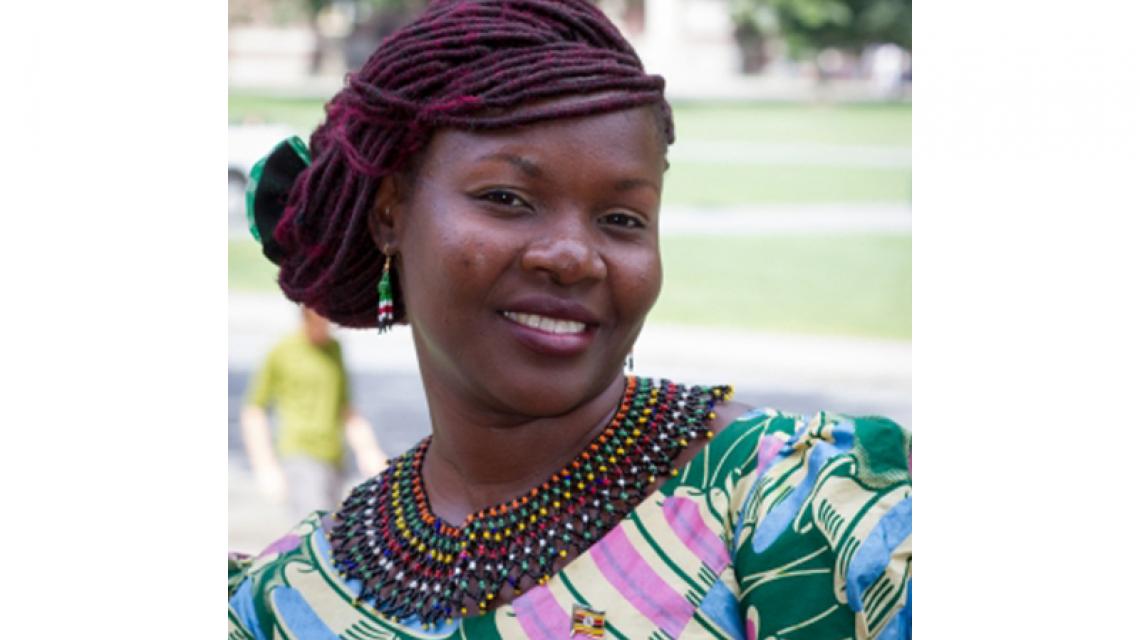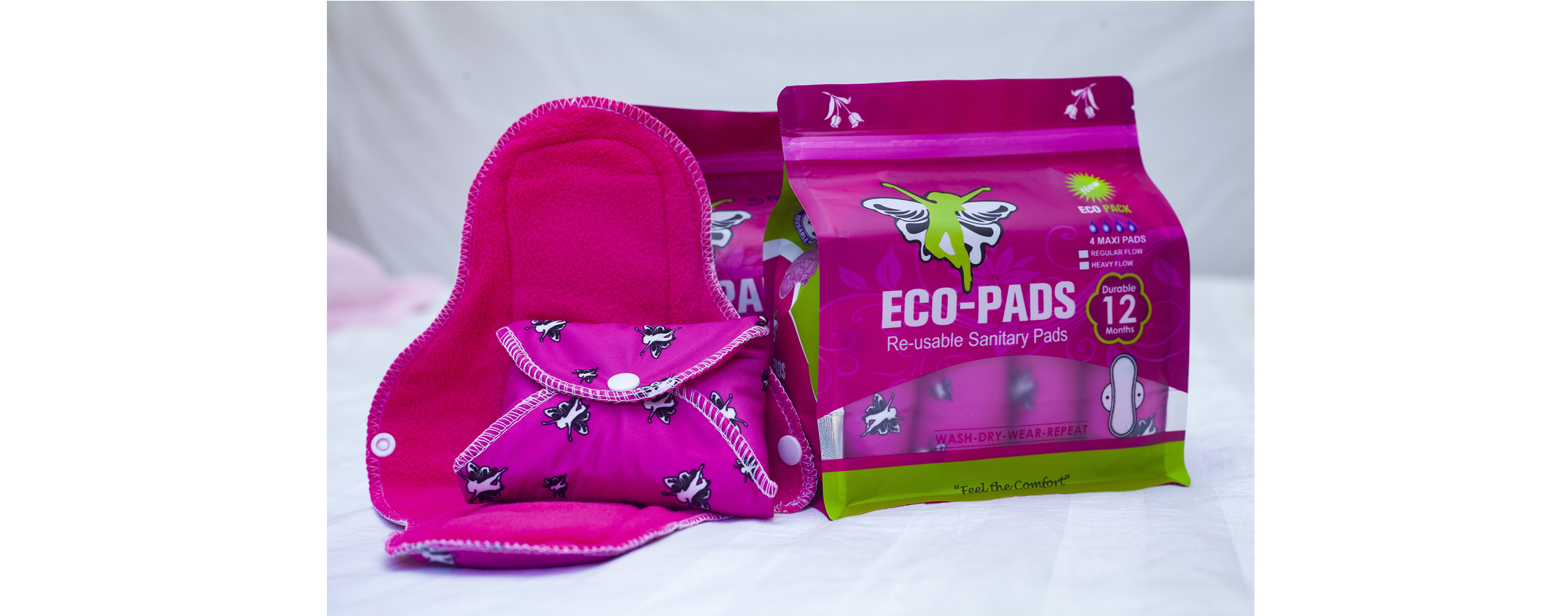Keeping Girls in School Longer — Before, During, and After the Pandemic
Lucy Athieno is a Ugandan entrepreneur working to empower East African women and girls, especially school age girls. She is the founder of Eco-pads, a vocal advocate of changing the silence around periods, and on a mission to empower girls to do and be more through their education. Lucy also is a 2014 Mandela Washington Fellow, the inaugural year of this flagship program of the U.S. Government’s Young African Leadership Initiative (YALI).
What is Eco-pads?
- Eco-pads – Uganda Limited makes reusable, washable sanitary pads that are affordable to girls and their families so they can be in school, and not at home, during their menstrual cycle. Eco-pads has helped over a million girls with our eco-friendly product and advocacy work for girls’ education and access to hand-washing and hygienic toilets in schools and public places.
Where did you get the inspiration for Eco-pads?
- Growing up, I had challenges accessing sanitary pads, and other girls from my school also struggled. Our teachers were not very encouraging and could not offer much support. It wasn’t until I went to university, that I talked about this problem with one of my lecturers and got a positive response and encouragement to take action. In 2009, when I was volunteering with an NGO in eastern Uganda, I worked with a few teenage girls who had the same challenges I had had in being able to afford sanitary pads. Those experiences made me started designing and making the pads our of cloth, and giving them to school-aged girls to try out and use.
How has Eco-pads grown since you first started the enterprise?
- We have come a long way, from an idea to an established organization with scalable manufacturing and outreach systems in place and impacting girls, families, teachers, and public officials. At first, I received a stipend that I used to buy my first two machines, and we were cutting little pieces of cloth and putting them together by hand. That is how we started, very simply and by trial and error. We were just making the pads and giving them out to the girls. But they would come back and complain, “It’s still leaking!” So, we went on improving and improving until we had our reliable product.
- When I came to the United States as a YALI Fellow in 2014, we were on our first version of the product. With time and trial, and the support of the USADF $25K entrepreneurship grant, we have evolved and expanded our reach. The products are available in different sizes and types, so girls and young women can use them reliably and be very comfortable. Eco-pads successfully have undergone the national testing standards and are available on a much wider basis than the small part of Eastern Uganda where we started. With increased capacity and demand, our production has increased more than ten-fold, from 50 to at most 100 pads a day in 2014 to 1,000 a day and more than 26,000 a month in 2020.
- We sell in small shops, kiosks and chain stores, distribute directly at schools, and provide Eco-pads to NGOs who are supporting girls’ education and rural development.
- Awareness of this problem and the need to keep girls in school has increased nationally and regionally, as well. We are working in our social venture, in our schools, and with government offices to reduce to zero the number of school days that girls miss and the number of school dropouts there are, due to lack of access to products, bathroom facilities, awareness, and correct information.
How does Eco-pads contribute to the overall empowerment of women in Uganda?
- Let me start with the factory side: Our production site is in the eastern part of the country, in a little village where there is a lot of poverty. Most of the girls don’t go to school, so we are creating job opportunities by and for young people. We work mostly with young people because we want to empower them. Some of our staff are widows who have needs and need to support their families.
- On the school side, the more girls who stay in school longer, the healthier and wealthier they will be. And the more their determination and success will encourage other girls around them and younger than them, to do the same: to continue with their studies, delay marriage and childbirth, and invest in their minds and themselves. This empowers women and our entire country.
Why is it important to have both men and women involved in Eco-pads?
- We want to break the stigma around menstruation being something that only affects females. We involve men, who have sisters, wives, girlfriends, and fiancés, and can be supporting the girls and women in their neighborhoods - instead of laughing at them. When young men are working at our manufacturing facility and earning money for themselves, they quickly understand the value of their work and the need to change their attitudes about the normal body function of menstruation. When we have men involved, we can break the silence faster.
- Student awareness training is for both boys and girls – to provide information and eradicate stigma. Also, when schools are open in person, we train the educators – both teachers and administrators. We provide peer educator training and have named our trainers the “Menstrual Hygiene Management Champions.” Both men and women teachers are reached, since some primary and high schools only have men teaching their students and leading their schools. If the girl has a menstrual challenge, who will they run to? We believe in equipping these teachers with information and knowledge, so they can support the girls during their cycles. East African schools do not come with pads in the girls’ restrooms and may not have separate boys’ and girls’ facilities.
How has the COVID-19 pandemic impacted Eco-pads? How have you dealt with challenges that have arisen?
- At the start of lockdown, we accommodated some of our staff so they could work from home and stay away from the office and site visits. But we have a lot of clients and stakeholders that are organizations supporting girls in our communities. With schools closed, all the children are home. Many organizations initially put their procurement on hold. We had to convince them to continue their orders for Eco-pads because the girls’ menstruation didn’t stop with the school doors being closed. We are all experiencing COVID-19, but periods continue, and the girls keep needing the products.
What do you see for the future? What is your ultimate goal?
- My goal to reach all of the African countries where access to affordable, hygienic sanitary pads are a problem, and for every one of those countries to have Eco-pads and the products, knowledge, and advocacy to keep girls in school longer. Right now, we are a quarter of the way through that journey. When we have a presence across the continent, and girls are no longer dropping out of school after reaching puberty and menstruating, then I will feel like I have accomplished what I set out to do. Growing up cannot be a barrier to education so many girls and young women.
Since this conversation, schools in Uganda remain closed and Lucy continues to lead Eco-pads. The facility is able to produce its regular volumes and large custom orders for clients, and she is committed to remaining in rural Uganda, where she is creating and maintaining jobs and steadily improving attitudes about menstrual hygiene and girls’ education.
Written by USADF intern Kate Yuan.



